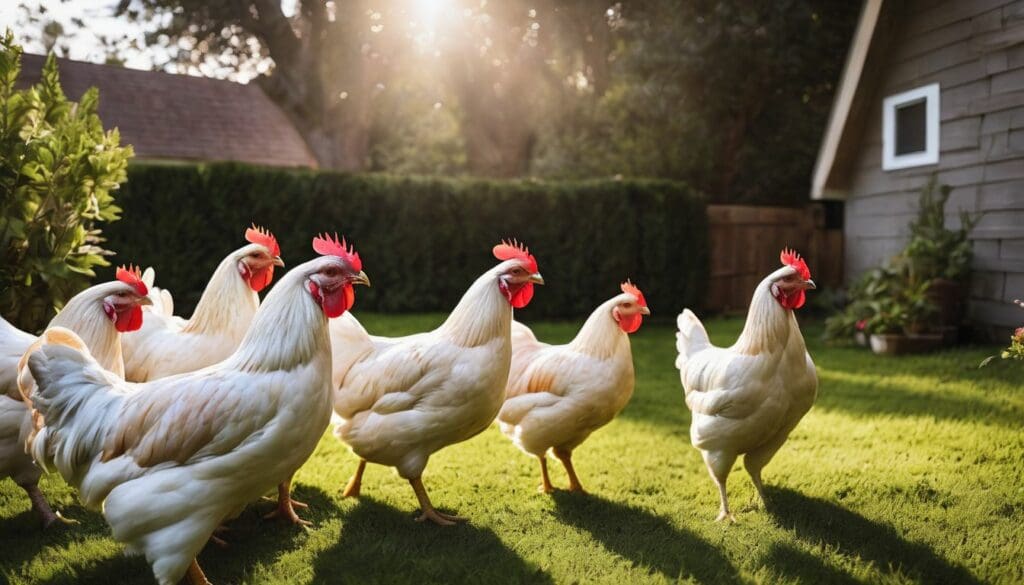Are you considering raising your own backyard chickens? Did you know that keeping a small flock of chickens can provide you with fresh eggs and natural pest control in your garden? In this article, we will guide you through the process of raising backyard chickens, covering everything from choosing the right breed to caring for your flock. Get ready to embark on an exciting journey into the world of poultry farming!
Key Takeaways
- Backyard chickens offer fresh eggs and natural pest control, but it’s vital to check local laws before starting as regulations differ widely.
- Choose chicken breeds suited to your climate and the purpose of raising them; consider space, temperament, and egg-laying capabilities.
- Set up a proper coop with secure fencing, ample space, ventilation, roosting bars, and predator protection measures.
- Provide chickens with a balanced diet including quality feed and access to clean water; regularly clean their living areas for health reasons.
- Protect against predators by using strong wire mesh for coops, installing alarms or lights, and supervising outdoor time.
Why should you raise backyard chickens?
Raising backyard chickens connects you with the cycle of life in a way that few other hobbies can. You’ll have fresh eggs daily, which are not only tastier but also much healthier than shop-bought ones due to their higher nutrient content and absence of chemicals.
As you tend to your flock, you participate in sustainable living practices by reducing food waste; chickens can eat many kitchen scraps turning them into high-quality protein.
Keeping these birds fosters a sense of responsibility and provides invaluable learning opportunities about animal husbandry and small-scale farming. Not only do they contribute to insect control by feasting on pests like ticks and mosquitoes, but their droppings enrich your garden as a natural fertiliser promoting lush plant growth.
Embracing poultry farming in your own yard can be a step towards self-sufficiency while aiding conservation efforts by preserving rare chicken breeds from extinction through responsible avian care and hen raising.
Understanding Local Laws for Raising Chickens
Before getting chickens, it is important to check local laws to ensure that keeping backyard chickens is legal in your area. There are also additional considerations such as zoning regulations and neighbour permissions that should be taken into account.
Are backyard chickens legal in your area?
Checking local laws is the first step in determining if you can keep chickens in your backyard. City and town regulations vary greatly, so it’s essential to look up the specific rules for your area.
Many places require a certain amount of space, restrictions on the number of chickens you can have, or rules against cockerels due to noise concerns. Some areas may demand permits or have zoning requirements that must be met.
To find this information, contact your local government offices or visit their website. Neighbourhood associations also often have guidelines on livestock care, including raising backyard chickens.
Failing to comply with these ordinances could lead not just to fines but potentially having to rehome your flock as well. Taking the time to research thoroughly ensures that your journey into small-scale farming starts off on the right foot legally and prevents future issues from cropping up unexpectedly.
Important considerations before getting chickens
Before bringing chickens into your backyard, it’s essential to consider a few crucial points to ensure their well-being and your success as a chicken keeper. Here are some factors to take into account:
- Space requirements for the number of chickens you plan to keep
- Time commitment for daily care and maintenance
- Understanding the local laws and regulations regarding chicken keeping in your area
- Access to a reliable source of chicken feed and supplies
- Potential impact on your neighbours and community
- Availability of veterinary care for your chickens
- Willingness to commit to caring for them in all weather conditions
Choosing Your Backyard Chicken Breeds
Consider factors such as climate, space, and egg production when selecting the right breed for your backyard. Some recommended breeds include Sussex, Orpington, and Rhode Island Red chickens.
Factors to consider
When choosing your backyard chicken breeds, consider the climate and environment of your area to ensure the selected breed is well-suited. Evaluate the purpose of raising chickens – whether for egg production, meat, or both, as this will guide you in selecting the most appropriate breed.
Additionally, think about the temperament and behaviour of the chicken breeds; some may be more docile and suitable for children while others are better suited to free-range environments.
Consider the space available within your backyard when preparing to build a chicken coop. It’s important to provide ample room for each bird to move around comfortably and access essentials like food and water.
Recommended breeds
After considering the factors that go into choosing the right chicken breed for your backyard, it is important to narrow down your choices based on your specific needs and preferences. Here are some recommended breeds for environmentally conscious individuals embracing small-scale farming:
- Rhode Island Red: Known for their hardiness and excellent egg-laying abilities, they are perfect for beginners.
- Australorp: These gentle birds are great layers, producing a large number of brown eggs.
- Sussex: They are dual-purpose birds, known for being friendly and adaptable to various climates.
- Orpington: Recognised for their calm nature and ability to lay plenty of large brown eggs.
- Wyandotte: These birds come in a variety of beautiful plumage patterns and are good layers.
Preparing for Your Chickens
Before you bring home your new feathered friends, it’s important to make sure they have the right setup. This includes sourcing chicks from a reputable hatchery, setting up a warm and safe brooder for them, and building a comfortable chicken coop.
Sourcing from a hatchery
When sourcing from a hatchery, consider breeds that thrive in your local climate. Select reputable hatcheries with sustainable practices to support environmentally friendly chicken rearing.
Look for heritage and rare breeds to contribute to conservation efforts and genetic diversity within the backyard chicken community. Choose chicks that are vaccinated against common diseases, promoting healthier flocks without relying on antibiotics.
Consider purchasing sexed chicks or hatching eggs if you are interested in specific genders or want the experience of witnessing the hatching process. This allows you to control flock composition while supporting ethical breeding practices by reducing male chick culling.
Setting up a brooder for chicks
To set up a brooder for chicks, you will need the following:
- A sturdy cardboard box or plastic container large enough to accommodate the number of chicks you have.
- A heat lamp with a 250 – watt bulb to maintain a temperature of around 95 degrees Fahrenheit in one area of the brooder.
- Pine shavings or another suitable bedding material to cover the floor of the brooder.
- A feeder and waterer specifically designed for chicks to ensure easy access and prevent spills.
- Ensure that there is sufficient space for the chicks to move around comfortably, but not too much space which can lead to overheating.
Building a chicken coop
To ensure a suitable living space for your backyard chickens, a well-constructed chicken coop is essential. It is necessary to consider various factors whilst building the coop, such as location, size, and materials used.
- Choose an area with good drainage to avoid waterlogging in the coop.
- Utilise durable materials like wood and wire mesh to construct a sturdy and secure coop that protects the chickens from predators.
- Ensure proper ventilation within the coop to maintain air circulation and prevent moisture build-up.
- Incorporate nesting boxes for hens to lay eggs comfortably.
- Install roosting bars at varying heights for chickens to perch on during rest periods.
- Implement adequate lighting to provide warmth during colder seasons and encourage egg production in winter months.
Caring for Your Flock
Provide your chickens with a balanced diet, protect them from predators and ensure their health and hygiene for a happy flock. Read on to learn more about caring for your backyard chickens.
Feeding and nutrition
When raising backyard chickens, it’s essential to provide a balanced diet for their optimal health and egg production. A good quality chicken feed that is high in protein, vitamins, and minerals is crucial for the well-being of your flock.
In addition to commercial feed, you can supplement their diet with kitchen scraps, grains, and greens to ensure they get a varied and nutritious diet. It’s important to also provide access to clean water at all times to keep your chickens hydrated and healthy.
Encouraging natural foraging by allowing your chickens access to outdoor spaces will help them find insects, worms, and plants which are beneficial supplements to their diet. Offering occasional treats like mealworms or fruits can also keep your flock happy while providing them with additional nutrients.
Protecting against predators
Once you have ensured your chickens are well-fed and healthy, it’s important to protect them from potential predators. Here are some crucial tips for protecting your flock from common threats:
- Secure your coop with strong wire mesh and lockable doors to prevent access by foxes, raccoons, and other nocturnal predators.
- Install motion – activated lights or alarms to deter predators from approaching the coop at night.
- Use guard animals such as dogs or geese to help protect the flock from aerial predators like hawks and owls.
- Regularly inspect the perimeter for signs of digging or attempts at breaching the fencing, ensuring that all gaps are sealed to prevent entry by small mammals or snakes.
- Implement safe free – ranging practices during daylight hours while supervising the flock to allow them to forage while keeping an eye out for any potential threats.
- Consider using predator – proof electric fencing in areas with high predator activity to create an additional barrier of protection for your chickens.
- Educate yourself about local wildlife and their behaviors, so you can anticipate and address potential risks before they become a threat to your flock.
Health and hygiene
After ensuring your chickens are safe from predators, maintaining their health and hygiene is crucial for their well-being. Regularly clean the coop to prevent diseases and ensure a healthy environment for your flock.
Provide fresh bedding, change water regularly, and keep the feed dry to avoid contamination.
Regularly inspect your chickens for signs of illness or injury. Monitor their egg production and appetite as indicators of good health. Make sure they have access to a balanced diet and seek advice from a poultry veterinarian if you notice any concerning symptoms.
Tips for Happy and Healthy Chickens
To keep your backyard chickens happy and healthy, provide enrichment activities like dust baths and toys. Regularly check for signs of illness and handle your chickens gently to ensure their well-being.
Enrichment for chickens
Chickens benefit from various enrichment activities to keep them healthy and happy.
- Provide a spacious outdoor area for them to roam and scratch
- Use perches and structures for climbing and roosting
- Scatter food for natural foraging instincts
- Offer objects like hanging mirrors or shiny materials for entertainment
Egg-laying and annual care
After providing enrichment for your chickens, it’s essential to focus on egg-laying and annual care. This crucial aspect of backyard chicken farming requires attention to detail and regular maintenance. Here are the important aspects to consider:
- Egg-laying cycle: Understand the factors affecting egg production such as breed, age, nutrition, and daylight hours.
- Nesting boxes: Provide clean and comfortable nesting areas for hens to lay eggs, encouraging consistent laying behaviour.
- Egg collection: Regularly gather eggs to prevent breakage and ensure freshness.
- Annual health check-ups: Schedule yearly veterinary check-ups to monitor the overall health of your flock.
- Moulting season: Recognise signs of moulting in chickens and adjust their diet to support healthy feather regrowth.
- Seasonal adjustments: Adapt chicken care routines based on changing weather conditions throughout the year.
Signs of illness and handling
Recognising the warning signs of chicken illness is vital for their well-being. Here’s how to identify and handle common health issues:
- Monitor changes in behaviour such as lethargy, decreased appetite, or abnormal posture.
- Regularly inspect your chickens for any unusual discharge from eyes, nostrils, or vents.
- Check for abnormal breathing sounds or wheezing during respiratory distress.
- Examine droppings for consistency, colour, and signs of parasites or blood.
- Handle chickens gently and observe their response to touch to detect pain or discomfort.
- Isolate sick birds promptly to prevent the spread of disease within the flock.
- Consult a veterinarian immediately if you notice persistent symptoms or concerns.
Conclusion
In conclusion, keeping backyard chickens can be a rewarding and enriching experience. Understanding local laws and choosing the right breed are essential steps. It’s crucial to prepare a safe and comfortable environment for your flock.
Proper care, attention, and regular health checks will ensure happy and healthy chickens in your small-scale farming adventure.
FAQs
1. What do I need to know before starting with backyard chickens?
Before you begin, understand the daily care and maintenance they’ll require, legal requirements for keeping chickens, and get a beginner’s guide for flock management.
2. How can I make sure my backyard chicken coop is safe?
To keep your chickens safe, build proper fencing around your coop to protect them from common predators and follow chicken coop plans that ensure security.
3. Can I raise chickens in the city or urban areas?
Yes! Urban farming includes raising free-range chickens; just make sure you’re following local laws about small-scale farming in your area.
4. What are some tips for caring for my flock throughout the seasons?
For healthy flocks year-round, learn how to care for chickens in different seasons by providing appropriate shelter and maintaining regular coop maintenance.
5. Is it okay to involve children in raising backyard chickens?
Absolutely! Teaching kids about raising chickens is a great way to introduce responsibilities and basic animal husbandry principles while having fun.





